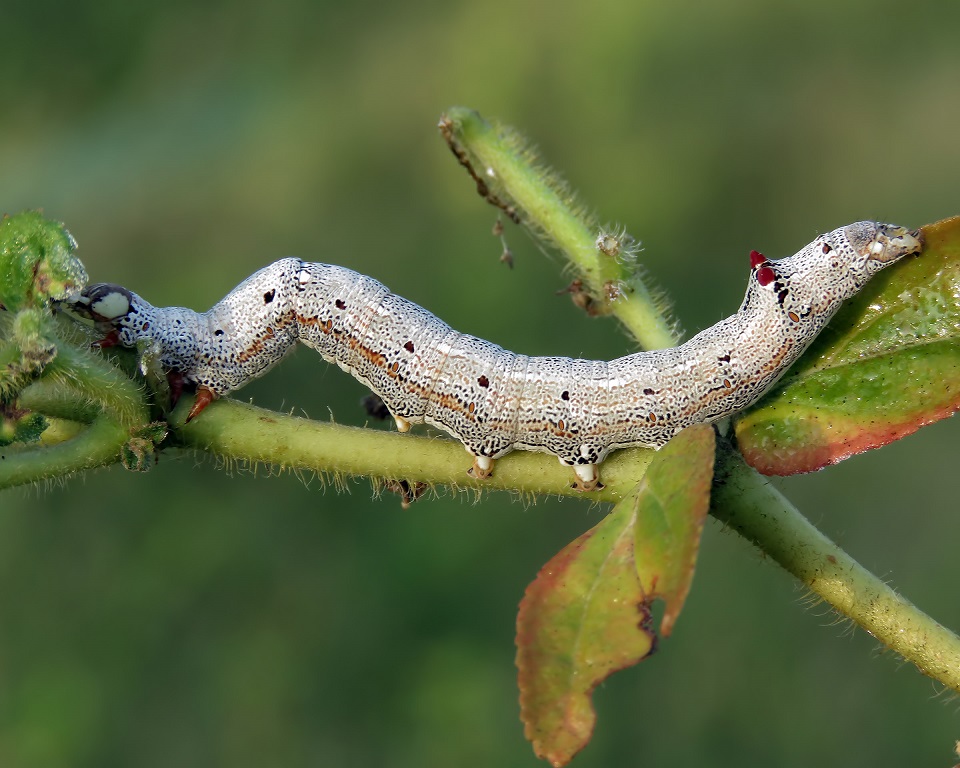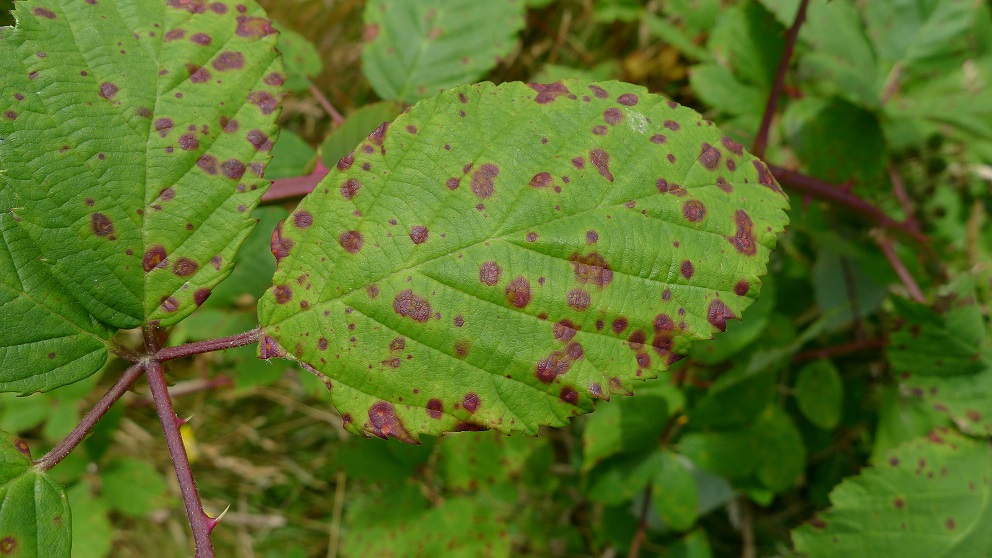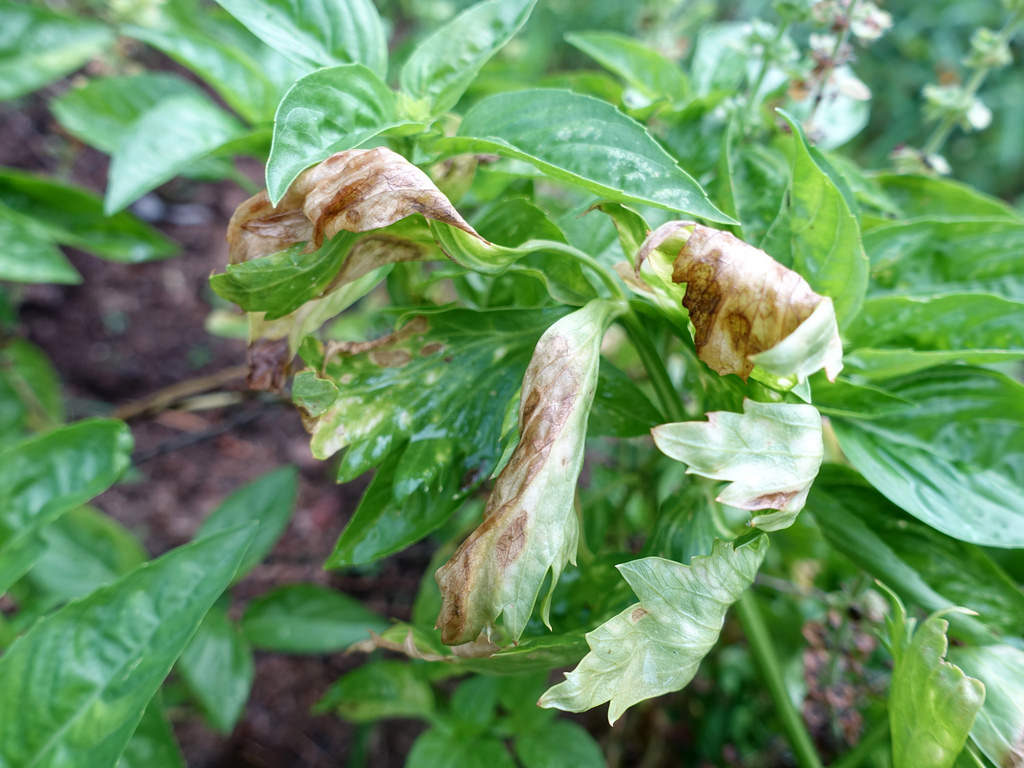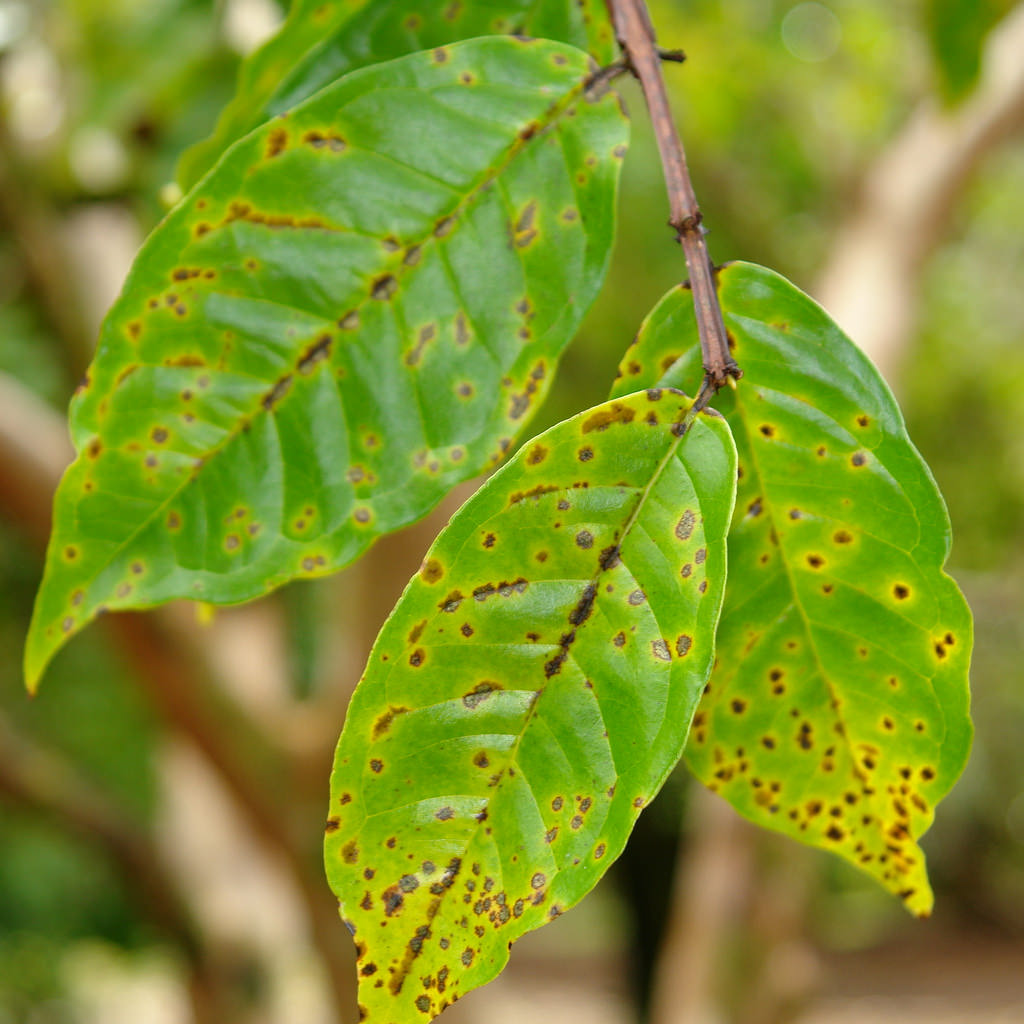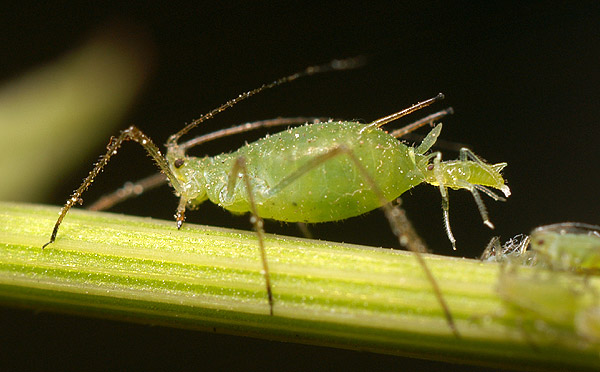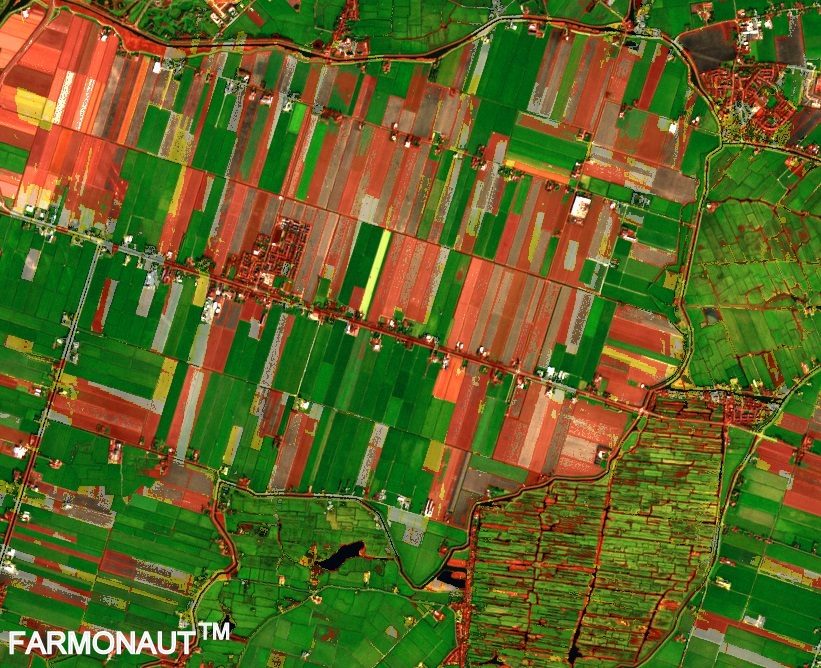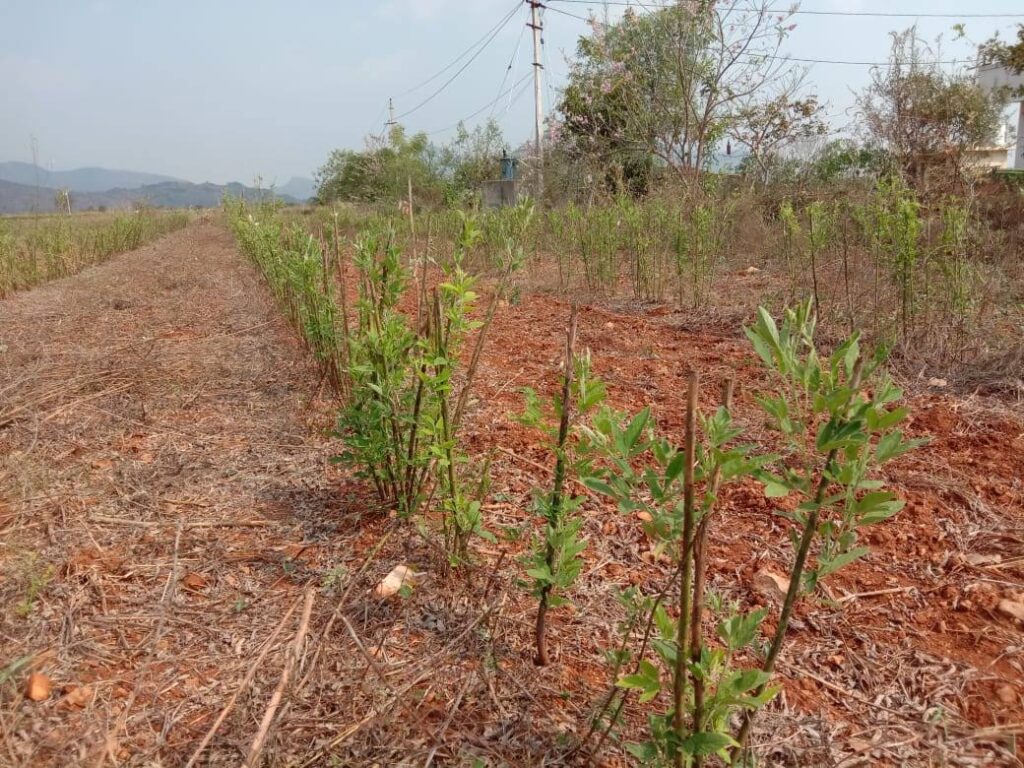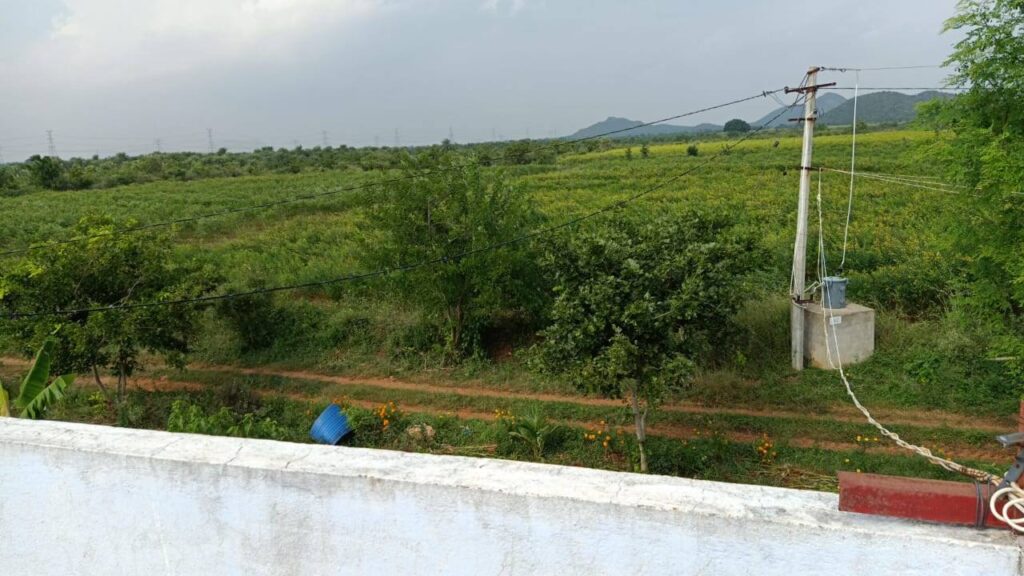Organic vs Sustainable Agriculture: Unraveling Eco-Friendly Farming Practices for a Greener Future
“Organic farming prioritizes natural inputs, while sustainable agriculture embraces over 17 different eco-friendly practices for farm management.“
In the realm of modern agriculture, two approaches have gained significant attention for their potential to create a more environmentally friendly food production system: organic farming and sustainable agriculture. While these terms are often used interchangeably, they represent distinct philosophies and practices in the world of eco-friendly farming. In this comprehensive exploration, we’ll unravel the intricacies of both organic and sustainable agriculture, examining their unique characteristics, benefits, and challenges.
As we delve into this topic, it’s crucial to understand that both organic and sustainable agriculture share a common goal: to produce food in a way that minimizes environmental impact and promotes long-term ecological balance. However, the methods they employ to achieve this goal can differ significantly. Let’s begin our journey by defining these two approaches and highlighting their key differences.
Defining Organic and Sustainable Agriculture
Organic Agriculture is a farming system that relies on ecological processes, biodiversity, and cycles adapted to local conditions rather than the use of synthetic inputs. It emphasizes the use of natural substances and processes to grow crops and raise livestock, strictly avoiding the use of synthetic fertilizers, pesticides, and genetically modified organisms (GMOs).
Sustainable Agriculture, on the other hand, is a broader concept that encompasses a wide range of practices aimed at meeting society’s present food and textile needs without compromising the ability of future generations to meet their own needs. It focuses on three main objectives: environmental health, economic profitability, and social and economic equity.
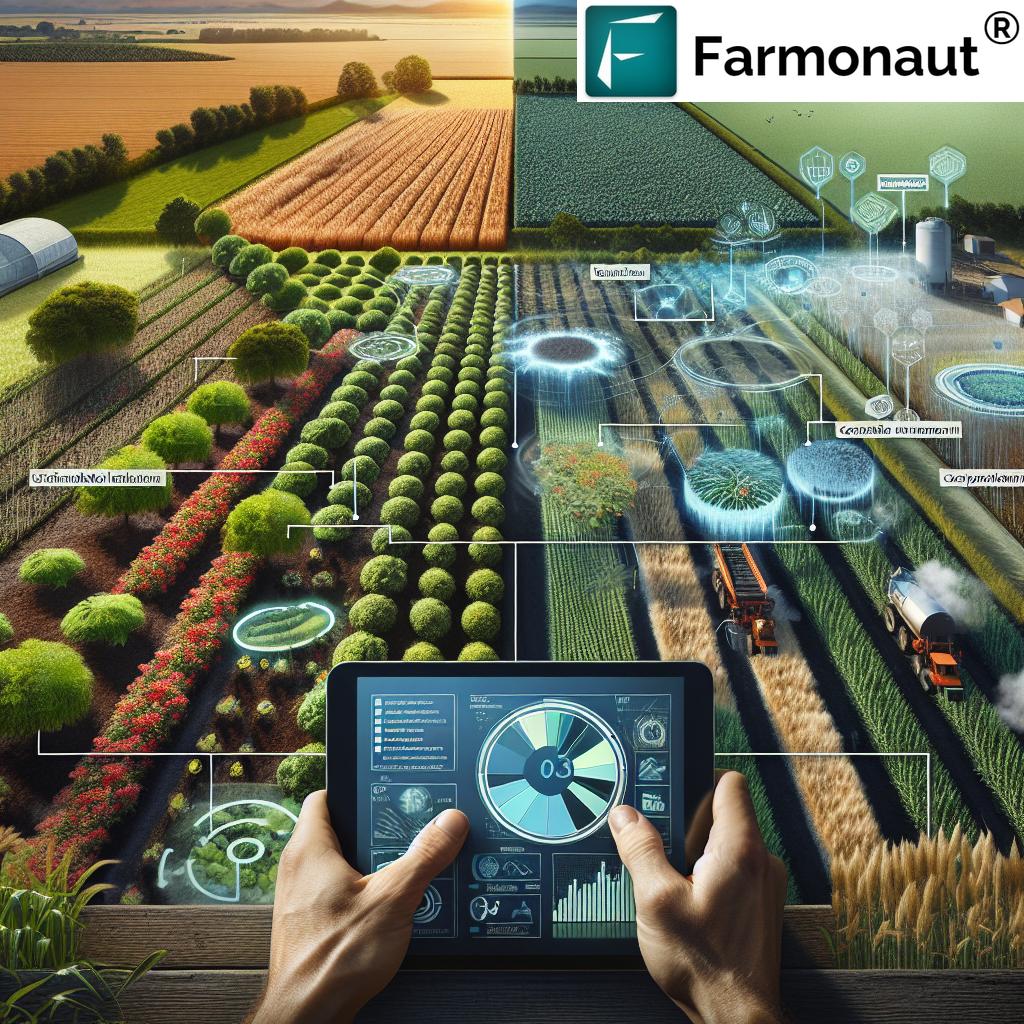
To better understand the nuances between these two approaches, let’s examine their key characteristics in a comparative table:
| Aspect | Organic Agriculture | Sustainable Agriculture |
|---|---|---|
| Definition | Farming system relying on ecological processes and natural inputs | Holistic approach to farming that balances environmental, economic, and social concerns |
| Primary Focus | Eliminating synthetic inputs and promoting natural processes | Optimizing resource use and minimizing environmental impact while maintaining productivity |
| Input Usage | Natural inputs only; no synthetic fertilizers or pesticides | Allows for judicious use of synthetic inputs when necessary |
| Certification Requirements | Strict certification process with specific standards | No formal certification, but various sustainability metrics exist |
| Soil Management Practices | Emphasis on building soil health through natural methods | Combines traditional and innovative techniques to maintain soil fertility |
| Pest Control Methods | Biological and cultural controls; no synthetic pesticides | Integrated Pest Management (IPM) approach, including limited chemical use |
| Water Conservation Techniques | Focus on natural water retention methods | Employs a range of efficient irrigation and water management strategies |
| Technology Integration | Limited use of modern technology | Embraces precision agriculture and smart farming technologies |
| Economic Considerations | Often associated with premium prices for products | Aims for long-term economic viability and efficiency |
| Environmental Impact | Focuses on minimizing direct environmental impacts | Considers broader environmental impacts, including carbon footprint |
Now that we’ve outlined the basic differences, let’s dive deeper into each approach, exploring their practices, benefits, and challenges.
Organic Agriculture: Nurturing Nature’s Balance
Organic farming practices are rooted in the principle of working with nature rather than against it. This approach to agriculture emphasizes the importance of soil health, biodiversity, and ecological balance. Let’s explore some key aspects of organic farming:
Soil Health Management in Organic Farming
At the heart of organic farming lies a deep commitment to soil health. Organic farmers employ various techniques to nurture and protect their soil:
- Crop Rotation: This practice involves changing the type of crop grown in a particular field each season. Crop rotation helps prevent soil depletion, breaks pest cycles, and improves soil structure.
- Composting: Organic matter is recycled through composting, creating a nutrient-rich soil amendment that enhances soil fertility naturally.
- Cover Cropping: Planting cover crops between main crop seasons helps prevent soil erosion, suppresses weeds, and adds organic matter to the soil.
- No-Till or Minimal Tillage: These practices minimize soil disturbance, helping to preserve soil structure and beneficial microorganisms.
“Crop rotation, a key practice in both organic and sustainable farming, can increase yields by up to 25% compared to monoculture systems.“
Natural Pest and Disease Management
Instead of relying on synthetic pesticides, organic farmers use a variety of natural methods to manage pests and diseases:
- Biological Control: Introducing beneficial insects or microorganisms that prey on crop pests.
- Companion Planting: Growing complementary plants together to deter pests or attract beneficial insects.
- Physical Barriers: Using nets, row covers, or other physical barriers to protect crops from pests.
- Natural Pesticides: When necessary, using pesticides derived from natural sources, such as neem oil or pyrethrin.
Challenges in Organic Farming
While organic farming offers numerous benefits, it also faces several challenges:
- Lower Yields: Organic farms often produce lower yields compared to conventional farms, especially during the transition period.
- Labor Intensity: Many organic practices, such as manual weeding, require more labor than conventional methods.
- Pest and Disease Management: Without synthetic pesticides, managing outbreaks can be more challenging and time-consuming.
- Certification Process: Obtaining and maintaining organic certification can be complex and costly for farmers.
Despite these challenges, the demand for organic products continues to grow, driven by consumer interest in health and environmental sustainability.
Sustainable Agriculture: A Holistic Approach to Farming
Sustainable agriculture takes a broader view of farming, aiming to balance environmental stewardship with economic viability and social responsibility. This approach incorporates a wide range of practices and technologies to achieve its goals.
Resource Conservation in Sustainable Farming
Sustainable agriculture places a strong emphasis on conserving natural resources:
- Water Management: Implementing efficient irrigation systems, such as drip irrigation or precision sprinklers, to reduce water waste.
- Energy Efficiency: Using renewable energy sources and energy-efficient equipment to reduce fossil fuel dependence.
- Soil Conservation: Employing practices like contour farming and terracing to prevent soil erosion and maintain soil health.
Integration of Technology in Sustainable Agriculture
Unlike organic farming, sustainable agriculture readily embraces modern technology to improve efficiency and reduce environmental impact:
- Precision Agriculture: Using GPS-guided machinery and sensor technology to optimize planting, fertilizing, and harvesting.
- Remote Sensing: Employing satellite imagery and drones to monitor crop health and make data-driven decisions.
- Smart Irrigation Systems: Utilizing weather data and soil moisture sensors to optimize water usage.
At Farmonaut, we’re at the forefront of integrating technology into sustainable farming practices. Our platform leverages satellite imagery and AI to provide farmers with real-time insights into crop health, soil moisture levels, and other critical metrics. This data-driven approach helps farmers make informed decisions about irrigation, fertilizer usage, and pest management, ultimately optimizing crop yields while minimizing resource wastage.

Economic Sustainability in Agriculture
Sustainable agriculture recognizes that farming must be economically viable to be truly sustainable. This involves:
- Diversification: Growing multiple crops or integrating livestock to spread economic risk.
- Value-Added Products: Processing raw agricultural products to create higher-value goods.
- Direct Marketing: Selling directly to consumers through farmers’ markets or Community Supported Agriculture (CSA) programs.
- Agritourism: Incorporating tourism activities to generate additional income.
Challenges in Sustainable Agriculture
While sustainable agriculture offers many benefits, it also faces several challenges:
- Initial Costs: Implementing sustainable practices and technologies can require significant upfront investment.
- Knowledge Gap: Farmers may need to acquire new skills and knowledge to implement sustainable practices effectively.
- Market Pressures: Competing with conventional agriculture in a market that often prioritizes low prices can be challenging.
- Policy Support: Lack of supportive policies and incentives can hinder the adoption of sustainable practices.
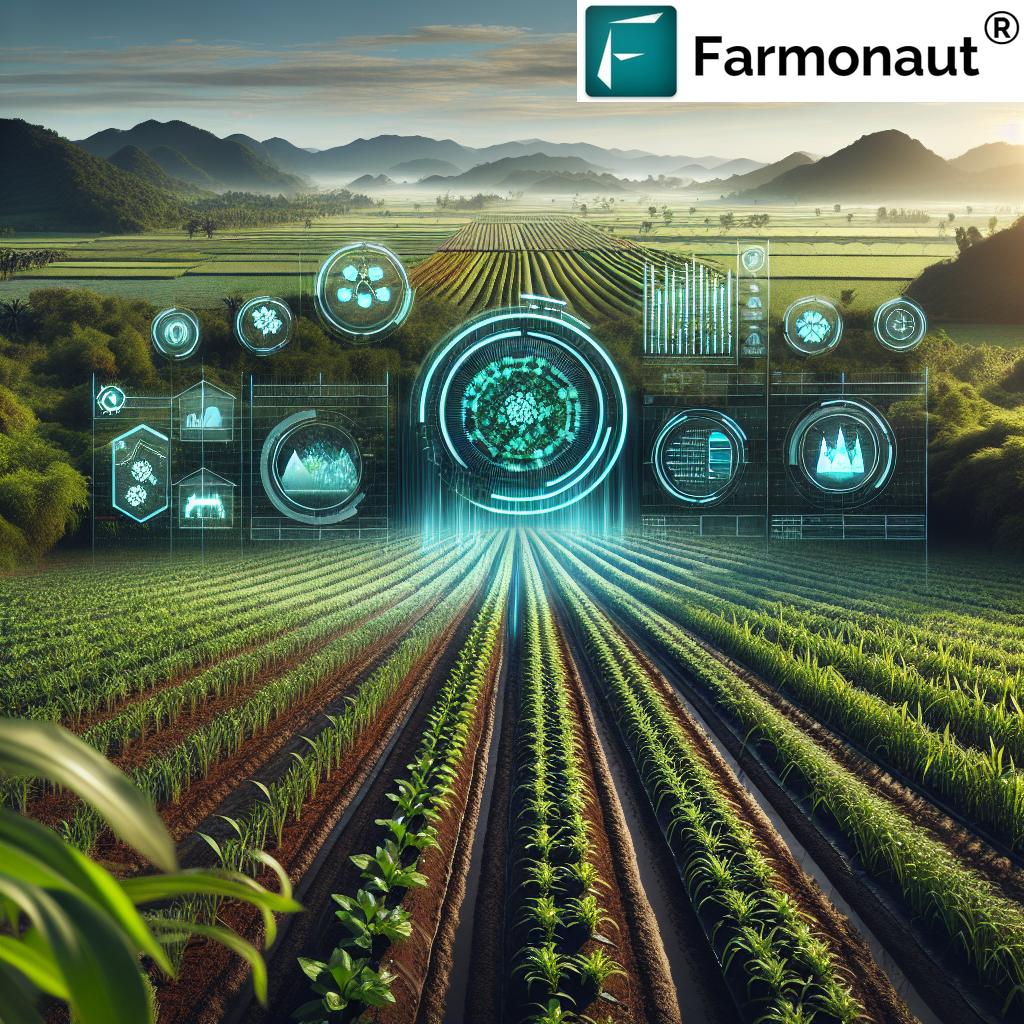
The Role of Technology in Modern Agriculture
As we’ve seen, technology plays a crucial role in sustainable agriculture. Let’s explore some of the innovative technologies that are shaping the future of farming:
Precision Agriculture and Smart Farming Applications
Precision agriculture uses technology to make farming more accurate and controlled. This approach to farm management relies on the use of information technology and a wide array of items such as GPS guidance, control systems, sensors, robotics, drones, autonomous vehicles, variable rate technology, GPS-based soil sampling, and automated hardware.
At Farmonaut, we’re pioneering the use of satellite technology and AI to bring precision agriculture to farmers of all scales. Our platform provides:
- Real-time Crop Health Monitoring: Using multispectral satellite images, we provide insights into vegetation health (NDVI), soil moisture levels, and other critical metrics.
- AI-driven Advisory System: Our Jeevn AI system delivers personalized farm advice, weather forecasts, and expert crop management strategies.
- Resource Management Tools: We offer solutions for efficient fleet and resource management, helping agribusinesses optimize their operations.
Explore Farmonaut’s API capabilities: Satellite and Weather API
For developers, check out our API Developer Documentation
Blockchain Technology in Agriculture
Blockchain technology is revolutionizing the agricultural supply chain by providing transparency and traceability. At Farmonaut, we’ve integrated blockchain-based traceability solutions that allow consumers to trace the journey of their food from farm to table. This technology enhances trust in the food system and helps reduce fraud in supply chains.
Internet of Things (IoT) in Agriculture
IoT devices are increasingly being used in agriculture to collect and transmit data about soil conditions, weather, crop growth, and livestock health. This real-time data helps farmers make more informed decisions and respond quickly to changing conditions.
Comparing Environmental Impacts: Organic vs Sustainable Agriculture
Both organic and sustainable agriculture aim to reduce the environmental impact of farming, but they approach this goal in different ways:
Soil Health and Biodiversity
Organic Agriculture: Places a strong emphasis on building soil health through natural methods, promoting biodiversity both above and below ground.
Sustainable Agriculture: Also prioritizes soil health but may use a combination of natural and synthetic methods to achieve this. It often includes practices that promote biodiversity, such as agroforestry and integrated pest management.
Water Conservation
Organic Agriculture: Focuses on building soil organic matter to improve water retention and reduce runoff. It also emphasizes the use of drought-resistant crops and natural mulching.
Sustainable Agriculture: Employs a wider range of water conservation techniques, including precision irrigation, water recycling, and the use of drought-tolerant crop varieties.
Carbon Footprint
Organic Agriculture: Generally has a lower carbon footprint due to the avoidance of synthetic fertilizers and pesticides, which are energy-intensive to produce.
Sustainable Agriculture: Aims to reduce carbon footprint through various means, including reduced tillage, efficient use of inputs, and carbon sequestration practices. At Farmonaut, we offer carbon footprint tracking tools to help agribusinesses monitor and reduce their environmental impact.
Download Farmonaut’s mobile apps for on-the-go farm management:
The Future of Agriculture: Integrating Organic and Sustainable Practices
As we look to the future of agriculture, it’s clear that both organic and sustainable farming practices have important roles to play in creating a more environmentally friendly and resilient food system. The key lies in integrating the best aspects of both approaches:
- Hybrid Systems: Developing farming systems that combine organic principles with sustainable technologies.
- Precision Organic Farming: Applying precision agriculture technologies to organic farming to improve efficiency and yields.
- Regenerative Agriculture: Focusing on practices that not only sustain but actively improve and regenerate the ecosystems in which food is produced.
- Climate-Smart Agriculture: Adopting practices that increase productivity while adapting to and mitigating the effects of climate change.
At Farmonaut, we’re committed to supporting farmers in their journey towards more sustainable and eco-friendly practices, regardless of whether they choose organic, sustainable, or a hybrid approach. Our technology platform is designed to provide valuable insights and tools that can benefit farmers across the spectrum of agricultural practices.
The Role of Consumers in Shaping Agricultural Practices
As we discuss the future of agriculture, it’s crucial to recognize the significant role that consumers play in shaping farming practices. Consumer demand and preferences have a powerful influence on agricultural production methods:
- Demand for Transparency: Consumers increasingly want to know where their food comes from and how it’s produced. This demand for transparency is driving the adoption of traceability technologies in both organic and sustainable farming.
- Preference for Local Food: The growing interest in locally produced food supports smaller-scale farmers and encourages sustainable practices.
- Willingness to Pay for Sustainability: Many consumers are willing to pay a premium for products they perceive as more environmentally friendly or ethically produced.
- Education and Awareness: As consumers become more educated about agricultural practices, they can make more informed choices that support sustainable and organic farming methods.
At Farmonaut, we recognize the importance of this consumer-driven change. Our blockchain-based traceability solutions not only help farmers and agribusinesses manage their supply chains more effectively but also provide consumers with the transparency they desire.
The Economic Viability of Eco-Friendly Farming
One of the key challenges in promoting both organic and sustainable agriculture is ensuring their economic viability. While these approaches can offer environmental and health benefits, they need to be financially sustainable for farmers to adopt them long-term.
Economic Considerations for Organic Farming
- Premium Pricing: Organic products often command higher prices, which can offset lower yields.
- Certification Costs: The process of obtaining and maintaining organic certification can be expensive.
- Transition Period: The 3-year transition period required for organic certification can be financially challenging for farmers.
Economic Aspects of Sustainable Agriculture
- Reduced Input Costs: Efficient use of resources can lead to lower costs for inputs like water and fertilizers.
- Long-term Soil Health: Sustainable practices can improve soil health over time, potentially leading to better yields and reduced need for inputs.
- Diversification: Many sustainable farming operations diversify their income streams, reducing financial risk.
At Farmonaut, we’re committed to making precision agriculture affordable and accessible to farmers worldwide. Our platform provides valuable insights that can help farmers optimize their operations, whether they’re practicing organic or sustainable agriculture. By leveraging technology, farmers can improve their productivity and profitability while maintaining their commitment to eco-friendly practices.
Policy and Support for Eco-Friendly Farming
The adoption of organic and sustainable agricultural practices is significantly influenced by government policies and support systems. Here are some key areas where policy can make a difference:
- Subsidies and Incentives: Governments can provide financial incentives for farmers to adopt organic or sustainable practices.
- Research and Development: Increased funding for research into organic and sustainable farming methods can lead to improved techniques and technologies.
- Education and Training: Providing farmers with access to education and training on eco-friendly farming practices is crucial for widespread adoption.
- Market Development: Policies that support the development of markets for organic and sustainably produced goods can help ensure fair prices for farmers.
While Farmonaut is not a regulatory body, we stay informed about agricultural policies and regulations to ensure our platform aligns with and supports compliance with relevant standards and practices.
Conclusion: Embracing a Greener Future in Agriculture
As we’ve explored throughout this blog post, both organic and sustainable agriculture offer valuable approaches to creating a more environmentally friendly food production system. While they differ in their specific methods and focuses, both share the common goal of reducing agriculture’s environmental impact and promoting long-term ecological balance.
Organic agriculture, with its emphasis on natural processes and avoidance of synthetic inputs, offers a path to farming that closely mimics natural ecosystems. It promotes biodiversity, soil health, and produces food free from synthetic pesticides and fertilizers.
Sustainable agriculture, on the other hand, takes a broader view, integrating ecological principles with modern technology to create farming systems that are environmentally sound, economically viable, and socially responsible. It offers flexibility in its approach, allowing for the judicious use of synthetic inputs when necessary while still prioritizing resource conservation and long-term sustainability.
The future of agriculture likely lies in a hybrid approach that combines the best aspects of both organic and sustainable farming. By integrating organic principles with sustainable technologies and practices, we can create farming systems that are truly resilient, productive, and environmentally friendly.
At Farmonaut, we’re committed to supporting farmers in their journey towards more sustainable and eco-friendly practices. Our platform provides valuable tools and insights that can benefit farmers across the spectrum of agricultural practices, from organic to conventional and everything in between. By leveraging technology, we aim to make precision agriculture accessible to all, helping farmers improve their productivity and profitability while maintaining their commitment to environmental stewardship.
As consumers, policymakers, and members of the global community, we all have a role to play in shaping the future of agriculture. By supporting eco-friendly farming practices, demanding transparency in our food systems, and advocating for policies that promote sustainable agriculture, we can contribute to creating a greener, more sustainable future for generations to come.
FAQ Section
Q: What is the main difference between organic and sustainable agriculture?
A: Organic agriculture focuses on eliminating synthetic inputs and promoting natural processes, while sustainable agriculture takes a broader approach, balancing environmental, economic, and social concerns. Sustainable agriculture may use some synthetic inputs judiciously, while organic farming prohibits them entirely.
Q: Is organic farming always more environmentally friendly than conventional farming?
A: While organic farming generally has lower environmental impacts in terms of chemical use and soil health, it’s not always more environmentally friendly in all aspects. For example, organic farming can sometimes require more land to produce the same amount of food as conventional farming.
Q: Can sustainable agriculture use GMOs?
A: Sustainable agriculture doesn’t categorically prohibit the use of GMOs. Some sustainable farming practices may incorporate GMOs if they’re deemed to contribute to overall sustainability goals, such as reducing pesticide use or improving drought resistance. However, the use of GMOs remains a topic of debate in sustainable agriculture circles.
Q: How does technology fit into organic and sustainable farming?
A: Technology plays a significant role in sustainable agriculture, with practices like precision farming and smart irrigation systems being widely adopted. In organic farming, technology use is more limited but still present, particularly in areas like natural pest control and soil health monitoring. Platforms like Farmonaut provide technology solutions that can benefit both organic and sustainable farming practices.
Q: Are organic and sustainable products more expensive?
A: Organic products are often more expensive due to lower yields and higher labor costs. Sustainable products may or may not be more expensive, depending on the specific practices used. In both cases, prices can vary widely depending on the product, location, and market conditions.
Farmonaut Subscriptions




